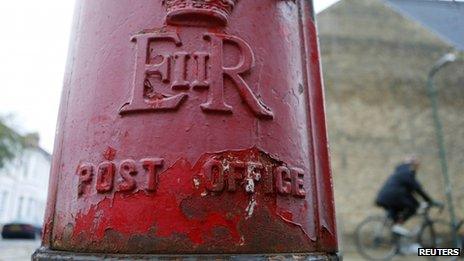Royal Mail workers' union backs a 'landmark' deal
- Published

The union said the deal was good for the company, customers and the employees
The Communication Workers' Union (CWU) will recommend to postal staff that they accept a new pay offer that it described as "landmark".
It is worth 9.06% over three years and gives workers a one-off pensionable lump sum of £200 before Christmas,
The agreement means the threat of a Christmas strike is averted.
Royal Mail's boss Moya Greene said it would provide "long term stability and certainty for Royal Mail, our employees and our customers".
She added: "Working together we can create a strong foundation for the continued success of our business."
CWU deputy general secretary, Dave Ward, said: "The agreement breaks new ground in the UK by incorporating extensive legally binding protections for employees alongside a commitment to improve industrial stability.
"This is a good deal for the company and customers as well as for employees, but investors should be clear that this agreement commits them to growth and there will be no tolerance to a race to the bottom on services and jobs."
Stability
The deal gives postal workers a 3% rise backdated to April this year, another 3% from April next year and 2.8% in 2015-16.
The union says it includes guarantees that the newly privatised Royal Mail will give workers legal protections on their terms and conditions, ensuring the Royal Mail will not outsource, sell or transfer any part of its business until a legal review takes place in 2019.
In addition, the CWU says it sets out improved industrial stability and safeguards pensions, as well as staving off the threat of the company employing new postal workers on inferior terms and conditions.
Another part of the agreement is for the two sides to work to create industrial stability with a re-launch of industrial relations arrangements and the introduction of mediation procedures alongside new governance arrangements.
Union members will vote on the recommendations in January 2014.
Privatised
The threat of industrial action was seen as one of the risks to the company when it went public in October. The government sold a 60% stake, of which staff received 10%.
The privatisation was opposed by the union and the share offer was seen as an attempt to smooth labour relations.
Shares have risen more than 80% since it first listed, prompting criticism that it was sold off too cheaply.
- Published27 November 2013
- Published30 October 2013
- Published16 October 2013